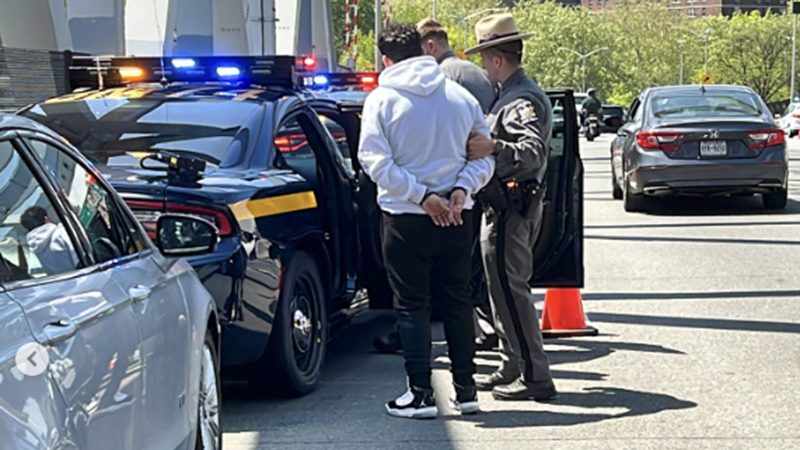
One of the most common purposes for America’s law enforcement officers is to conduct traffic stops of motorists who are tooling around town unsafely and illegally, resulting in cops potentially discovering and addressing substantive issues during the interaction.
Driven by a fusion of preemptive mindsets and lifesaving feats, LEOs’ duties span many aspects, traffic being a large portion of how they engage citizens in the community, providing education (reminders) while sometimes receiving usable information (impromptu intelligence gathering).
Liberty, Missouri, police department officers diligently conducted a traffic enforcement initiative whereby an entire squad of cops engaged in “high visibility enforcement” regarding the motoring public evincing unsafe driver behaviors and/or bogus automobile plates (“Operating an unregistered vehicle” is a criminal offense resulting in arrest and a citation and the car being impounded by police).
Boy, did it yield a lot of results!
Per a Liberty PD press release: “Over five shifts, C Squad issued 105 citations ranging from speeding, red light violations, no insurance, and expired/improperly registered vehicles. We also recovered 30 unregistered license plates and 14 temporary tags from vehicles. These 93 traffic stops also resulted in 10 warrant arrests, 4 driving while suspended arrests, and 1 drug arrest. They also located an armed carjacking vehicle and solved a theft of packages case. This highlights the critical role traffic stops play in enhancing community safety and enforcing the law!
“Talk about cleaning up the streets!”
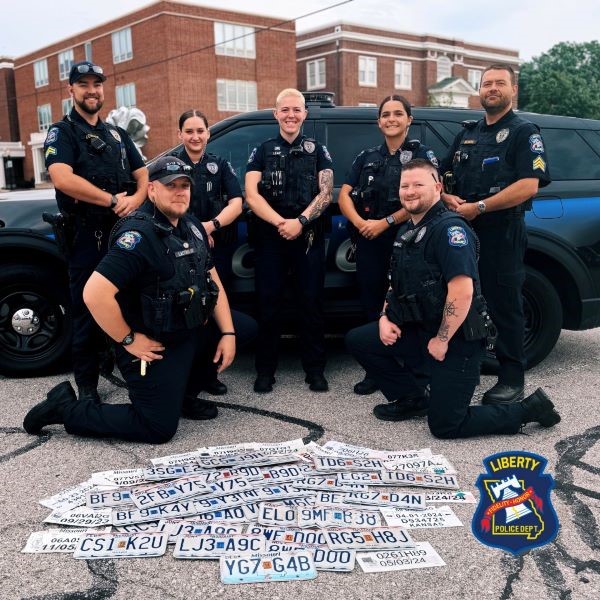
(Photo courtesy of the Liberty Police Department.)
As raucous rhetoric goes, police personnel conducting traffic stops are often condemned as unimportant and an inconvenience to/by some citizens. “Go fight real crime!” they admonish. (Be sure to read comments critiquing the phenomenal work of Liberty PD’s traffic enforcement cops.)
Others employ converse reasoning such as, “You’ll wanna know where cops were when another driver does something bad and it impacts you and your family!”
One comment among many praised police work and implored Liberty cops to conduct more traffic enforcement:
“I realize some people don’t believe this stuff is important, but it certainly means a lot to us law-abiding citizens who become victims of individuals who have no insurance when they choose to speed and not follow other traffic laws, then cause accidents. I am not saying I’m perfect. But I certainly understand the chaos caused when individuals choose to be reckless and irresponsible. So just don’t. Thank you, Liberty PD.”
Another commenter put it this way: “They all made bad choices. It doesn’t matter that they ‘have’ to drive to work, an improperly registered vehicle will violate their insurance so essentially/legally they are driving a vehicle without valid insurance…does that excuse their behavior if they get into an accident and their insurance doesn’t pay out and you’re now stuck with the bill? Everyone knows what it takes to drive a legal vehicle in Missouri. They chose not to and got caught. It’s on them, not the hardworking LEO.”
Granted, cops can’t be everywhere at once…especially nowadays with the dwindled police resources, compliments of a certain faction of elected officials and their constituents stubbornly barking that cops are not needed in our society. Those who bought into this fictional travesty have helped cleave funds from police budgets designed to implement public safety for every citizen, including the budget slashers and the naysayers behind the defund-the-police absurdity.
On that note, I discovered the following in the Liberty PD mission statement: “With a lean and very efficient level of police staffing…” Interesting times we live in, using the word “lean” to explain sworn strength.
Nevertheless, the remaining police personnel reporting for duty set out to do the job as best possible, all while harboring officer safety in an increasingly violent environment, especially under cover of darkness for midnight shift officers.
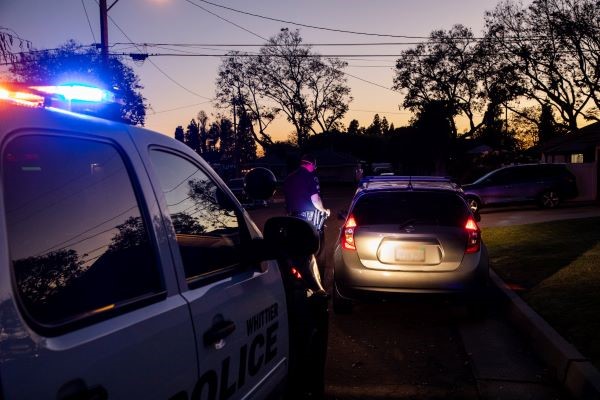
(Photo courtesy of the Whittier Police Department.)
Recently, Dan Bongino was in the driver’s seat when pulled over by a police officer. This is Mr. Bongino’s impression of the traffic stop:
“Just got pulled over by the local police for a traffic violation. TOTALLY my fault. Brain lapse.
“For reasons beyond the scope of this tweet, my windows don’t roll down so I had to SLOWLY open the door.
“And it reminded me of how dangerous policing is. These men and women are a hair’s length away from death or serious injury with every traffic stop and 911 call.
“The officer was an absolute professional and couldn’t have been kinder.
“Also, a big thanks to all of the men and women in blue for having the [courage] to do this tough job.”
Indeed, traffic stops notoriously imperil law enforcement officers…yet often yield incredible results when implemented. (Mindboggling…that some municipalities are still considering replacing cops with civilian employees to conduct traffic stops in their jurisdiction!)
For scale, Liberty PD is considered a modest-sized law enforcement agency. Imagine the metropolis police forces and the gobs of crime they could collectively prevent by diligently conducting traffic stops, especially those whose local governments do not foolishly prohibit cops from stopping motorists for certain reasons, defeating the purpose and potentially granting Bon voyage! to drivers actively involved in criminality.
Poster Child for Ludicrous Public Safety Initiatives
Infamous for legislating anti-police garbage, if the Los Angeles City Council gets its way, the LAPD will be prohibited from conducting traffic stops…
Per an NBC report, “The Los Angeles City Council Wednesday approved plans to try and prevent police officers from using traffic stops to catch people suspected of crimes while they are driving on city streets.
“The council’s 13-0 vote marks the beginning of a research project to collect information about how far the city can go to stop police officers from enforcing state traffic laws.”
Absurd logic but not shocking, given the locale leadership’s anti-cop stance.
If this idiocy spreads throughout Cali, traffic enforcement operations stemming from citizen complaints about observed dangers of/for drivers in any given area will go unabated.
For example, the Riverside Police Department initiated a traffic enforcement campaign at a given location after receiving multiple complaints from Riverside residents. In November 2023, Riverside PD cops addressed citizens’ concerns by forming a traffic enforcement operation at the specified danger zone, the results of which were astronomical in an astoundingly brief block of time:
“In response to multiple 3-1-1 complaints, our traffic team focused their enforcement efforts this morning in the area of Washington Street, Dufferin Avenue, and Frances Street. In just 2 1/2 hours, our motor officers stopped 113 vehicles that failed to obey the posted traffic signs, issued 111 citations, and towed 2 vehicles.
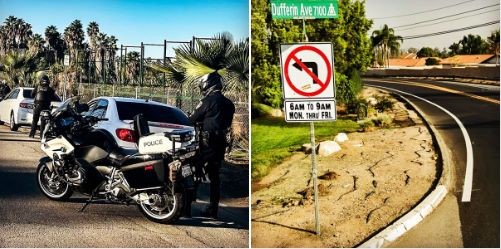
(Photo courtesy of the Riverside Police Department.)
“We want to remind everyone that ignoring those signs and laws can lead to devastating consequences, not just for ourselves but also for others on the road. Together, let’s make a conscious effort to be responsible drivers and protect the well-being of everyone on our streets.”
Given the significant stats achieved in a small amount of time, the LA City Council’s intentions to prohibit cops from conducting traffic enforcement betrays public safety and invites liability (imperiled civilians hired to mitigate traffic infractions), much to the delight of criminals tooling around town and wreaking havoc without the possibility of apprehension.
The polar opposite of the LA City Council mindset yields far better results and a reputation for a better quality of life for residents, merchants, and visitors in a municipality or county.
Traffic-Oriented Policing
One of the boxes I checked when researching law enforcement agencies whose stalwart practices garnered a solid reputation built upon a bona fide foundation of proactively preempting crime was its notoriety of unrelenting traffic enforcement.
As a rookie officer, it didn’t take long to hear the oft-uttered opinion of drivers I stopped, candidly claiming they usually circumvent driving through the city due to the police department’s reputation of traffic enforcement. This statement can easily be interpreted as someone who knows they may have a few skeletons riding around with them, avoiding detection by going around the sworn observers. I took it as a compliment; we diligently did our job.
Many of the arrests made throughout my police career stemmed from traffic enforcement. Once probable cause was established, enabling lawfully pulling over motorists for investigation, the top reasons leading to arrest were DUI, active warrants, narcotics, NVDL (No Valid Driver’s License), and HTO (Habitual Traffic Offender, automatic felony arrest in Florida).
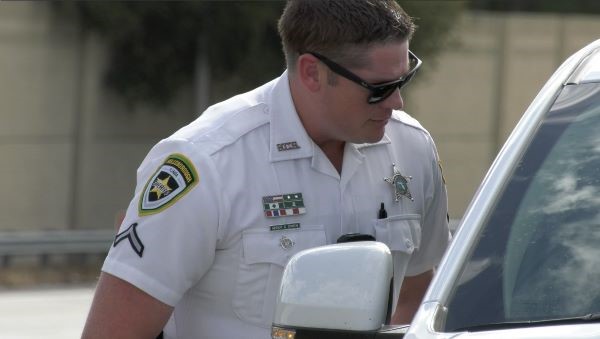
(Photo courtesy of the Hillsborough County Sheriff’s Office.)
In the context of otherwise good people operating a car that may have a minor equipment issue (inoperable brake light), stopping such drivers, bringing attention to what they likely were unaware of since they do not have eyes in the backs of their heads, often paid dividends for law enforcement. How so?
Law-abiding citizens operating motor vehicles with minor defects sometimes, during the traffic stop, offered intelligence about suspected drug dens that have “tons of vehicle traffic at all hours” near where they lived.
Whether they were to receive a citation or not, some people harbor the credo “See something, say something.” Everyone knows how narcotics distribution out of a residence brings violent actors to the community.
With the scourge of street takeovers plaguing jurisdictions across the country, citizens play an imperative role, reporting to the police when these danger zones pop up…
“The San Joaquin County Sheriff’s Office is dedicated to ensuring that our streets and roadways become and remain safe for our community. We have seen an increase in sideshow and reckless driving behaviors, making it more important than ever for our citizens to be vigilant and help us be our eyes in the community and bring this activity to our attention when we aren’t there to see it ourselves.”
The See something, say something campaign paid dividends that looked like this:
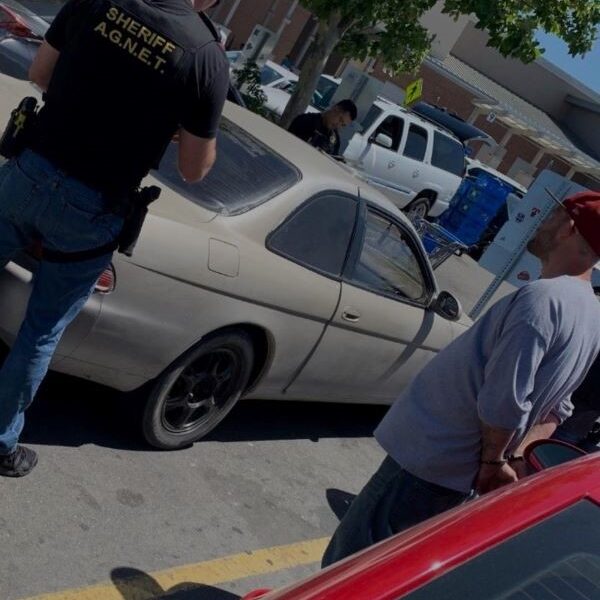
(Photo courtesy of the San Joaquin County Sheriff’s Office.)
These nuggets provided by citizens were forwarded to our Street Crimes undercover officers to conduct surveillance, substantiate the complaint, and cement a fact-finding operation to eventually serve a search warrant, make arrests, and shut down the drug-peddling den.
If the powers-that-be harbor mindsets to sever cops from making traffic stops, these and so many more criminal violations are free to fester, without impediment. With this, unbeknownst to them, citizens are in the reticles of drivers “riding dirty.”
Hence, law enforcement officers proactively conducting traffic enforcement of any kind help clean up the streets. Nothing new. Just a revisit of the concept due to political orchestrations hell-bent on ridding dangerous roadways of cops, not criminals tooling around town.
Pathetic, but here we are…with planned traffic enforcement operations blitzing the bad guys and sterilizing the streets, one stop at a time.